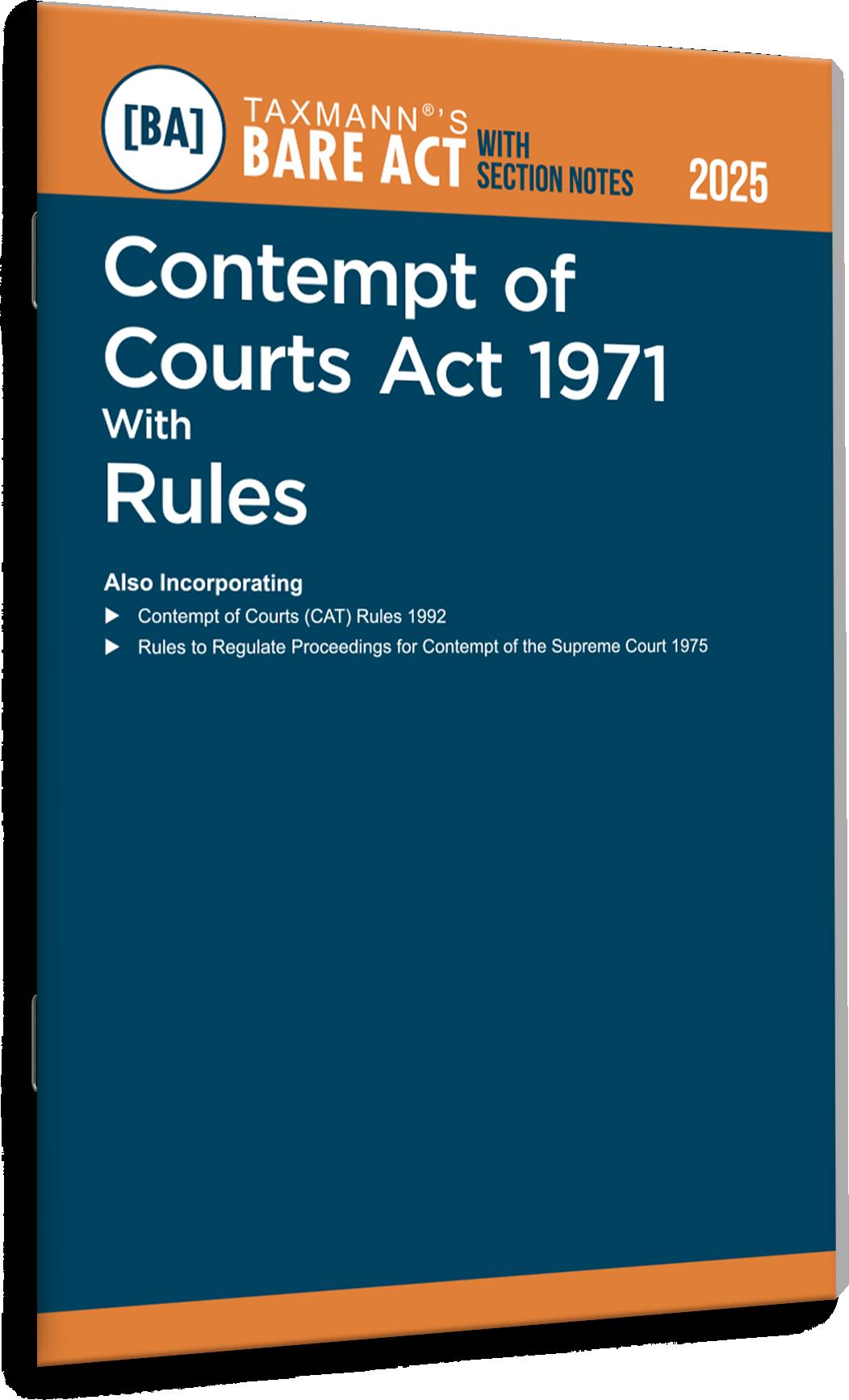© Taxmann Price : ` 105
Published by : Taxmann Publications (P.) Ltd.
Sales & Marketing : 59/32, New Rohtak Road, New Delhi-110 005 India
Phone : +91-11-45562222
Website : www.taxmann.com
E-mail : sales@taxmann.com
Regd. Office : 21/35, West Punjabi Bagh, New Delhi-110 026 India
Printed at :
Tan Prints (India) Pvt. Ltd.
44 Km. Mile Stone, National Highway, Rohtak Road Village Rohad, Distt. Jhajjar (Haryana) India
E-mail : sales@tanprints.com
Disclaimer
Every effort has been made to avoid errors or omissions in this publication. In spite of this, errors may creep in. Any mistake, error or discrepancy noted may be brought to our notice which shall be taken care of in the next edition. It is notified that neither the publisher nor the author or seller will be responsible for any damage or loss of action to any one, of any kind, in any manner, therefrom. It is suggested that to avoid any doubt the reader should cross-check all the facts, law and contents of the publication with original Government publication or notifications.
No part of this book may be reproduced or copied in any form or by any means [graphic, electronic or mechanical, including photocopying, recording, taping, or information retrieval systems] or reproduced on any disc, tape, perforated media or other information storage device, etc., without the written permission of the publishers. Breach of this condition is liable for legal action.
For binding mistake, misprints or for missing pages, etc., the publisher’s liability is limited to replacement within seven days of purchase by similar edition. All expenses in this connection are to be borne by the purchaser. All disputes are subject to Delhi jurisdiction only.
CONTEMPT OF COURTS ACT, 1971
19. Appeals 17
20. Limitation for actions for contempt 18
21. Act not to apply to Nyaya Panchayats or other village courts 19
22. Act to be in addition to, and not in derogation of, other laws relating to contempt 19
23. Power of Supreme Court and High Courts to make rules 19
24. Repeal 19
SUBJECT INDEX 21
CONTEMPT OF COURTS (CAT) RULES, 1992
1. Short title and commencement 23
2. De nitions 23
3. Form of motion 23
4. Parties to the proceedings 24
5. Content of the petition 24
6. Taking cognizance 25
7. Initiation of proceedings 25
8. Preliminary hearing and notice 25
9. Compelling attendance 25
10. Appearance of the respondent
11. Reply by the respondent
12. Right to be defended by an Advocate 26
13. Hearing of the case and trial 26
14. Assistance in the conduct of proceedings 27
15. Procedure for trial 27
16. Expenses of witnesses 27
17. Execution of sentence
18. Execution of processes
19. Procedure on forfeiture of the bond
20. Apology at any stage of the proceedings
21. Costs 28
22. Application of other rules of the Tribunal
23. Application to pending proceedings 28
FORM I: Notice to Respondent 29
RULES TO REGULATE PROCEEDINGS FOR CONTEMPT OF THE SUPREME COURT, 1975
Contempt of Courts Act, 1971
[70 OF 1971]1
An Act to de ne and limit the powers of certain courts in punishing contempts of courts and to regulate their procedure in relation thereto
BE it enacted by Parliament in the Twenty-second Year of the Republic of India as follows:—
Short title and extent.
1. (1) This Act may be called the Contempt of Courts Act, 1971.
(2) It extends to the whole of India.
2[***]
De nitions.
2. In this Act, unless the context otherwise requires,—
(a) “contempt of court” means civil contempt or criminal contempt;
(b) “civil contempt” means wilful disobedience to any judgment, decree, direction, order, writ or other process of a court or wilful breach of an undertaking given to a court;
(c) “criminal contempt” means the publication (whether by words, spoken or written, or by signs, or by visible representations, or otherwise) of any matter or the doing of any other act whatsoever which—
(i) scandalises or tends to scandalise, or lowers or tends to lower the authority of, any court; or
(ii) prejudices, or interferes or tends to interfere with, the due course of any judicial proceeding; or
(iii) interferes or tends to interfere with, or obstructs or tends to obstruct, the administration of justice in any other manner;
(d) “High Court” means the High Court for a State or a Union territory, and includes the court of the Judicial Commissioner in any Union territory.
1. Dated 24-12-1971.
2. Proviso omitted by the Jammu and Kashmir Reorganisation Act, 2019, w.e.f. 31-10-2019. Prior to its omission, proviso read as under:
“Provided that it shall not apply to the State of Jammu and Kashmir except to the extent to which the provisions of this Act relate to contempt of the Supreme Court.”
COMMENTS
SECTION NOTES
2.1 Contempt of Court [Section 2(a)]
“Contempt of court” means civil contempt [Section 2(b)] or criminal contempt. [Section 2(c)]
The distinction between civil contempt and criminal contempt is important. I civil contempt case, where the Court considers that a fine alone is not sufficient as a sentence, the Court has the discretion to sentence the contemner to detention in civil prison instead of simple imprisonment. [See Section 12(3)]
“Contempt of court” does not cover contempt of Nyaya Panchayats or other village courts as this Act does not apply to contempt of Nyaya Panchayats or other village courts.
[See Section 21]
2.2 Civil Contempt [Section 2(b)]
“Civil contempt” means: wilful disobedience to any judgment, decree, direction, order, writ or other process of a court; or wilful breach of an undertaking given to a court;
2.3 Criminal Contempt [Section 2(c)]
The ingredients of “Criminal contempt” are:
A. Doing of any of the specified acts: It involves doing of any of the following specified acts—
(a) the publication (whether by words, spoken or written, or by signs, or by visible representations, or otherwise) of any matter, or
(b) the doing of any other act whatsoever
B. Results of specified acts: The result of doing of either (a)/(b) above is—
(i) scandalises or tends to scandalise, or lowers or tends to lower the authority of, any court; or
(ii) prejudices, or interferes or tends to interfere with, the due course of any judicial proceeding; or
(iii) interferes or tends to interfere with, or obstructs or tends to obstruct, the administration of justice in any other manner;
The above definition of “criminal contempt” must be read in the light of sections 3 to 7. No court shall impose a sentence under this Act for a contempt of court unless it is satisfied that the contempt is of such a nature that it substantially interferes, or tends substantially to interfere with the due course of justice. [Section 13(a)]
2.4 High Court [Section 2(d)]
“High Court” means the High Court for a State or a Union territory, and The term also includes the court of the Judicial Commissioner in any Union territory.
CASE LAWS
Disobedience of Court Orders - Interference with Justice - The appellant was convicted under the Contempt of Courts Act for deliberately flouting a civil court’s injunction order that favoured the respondent’s business, “Ladies Corner.” Despite being aware of the injunction, the appellant locked the shop and removed the respondent’s
son from the premises, thereby obstructing the judicial process. The Supreme Court upheld the High Court’s findings that the appellant’s actions intentionally interfered with the course of justice, affirming his conviction and a fine of Rs. 1,000. - K. S. Villasa v. Ladies Corner AIR 1999 SC 2140.
Criminal Contempt - Enforcement of Judicial Authority - The Supreme Court addressed defiance by a contemnor, who had persistently refused to comply with its orders. Despite holding a high office as Speaker of the Assembly, the contemnor was proceeded against for actions unrelated to his official capacity. The Court emphasized the necessity of upholding judicial dignity and authority, directing the Union Government to ensure his presence as ordered. A subsequent affidavit from the contemnor expressed willingness to appear if his exemption plea was denied, leading to the withdrawal of the contempt proceedings upon his compliance. I. Manilal Singh alias M. Manihar Singh v. Union of India AIRONLINE 1993 SC 392.
Scandalizing the Court - Criminal Contempt by Advocate - The Supreme Court addressed a suo motu contempt petition against an advocate who posted tweets criticizing the judiciary and alleging misconduct by the Chief Justice of India and the last four CJIs. These tweets were found to scandalize the court and undermine the dignity and authority of the judiciary, thereby constituting criminal contempt under section 2(c). The Court rejected the defense that such criticism was an exercise of free speech under Article 19(1)(a) of the Constitution, affirming that fair criticism must not cross into contemptuous vilification. - In Re: Prashant Bhushan AIRONLINE 2020 SC 680.
Prima Facie Contempt - Refusal to Retract Allegations - The Supreme Court addressed a case involving prima facie contemptuous allegations made against judges in petitions and supporting affidavits. Despite being urged to withdraw their statements, the petitioners stood by their accusations and demanded the arrest of twelve High Court judges. The Court, emphasizing the need to uphold judicial decorum, issued notices requiring the petitioners to show cause why contempt proceedings should not be initiated, highlighting the gravity of their obstinate and defiant stance. - Leila David v. State of Maharashtra AIRONLINE 2009 SC 329.
Civil Contempt - Non-Adherence to Shareholding Orders - The Supreme Court dealt with a case involving the deliberate failure to comply with its orders maintaining the status quo on shareholding of Fortis Healthcare Limited (FHL) by Fortis Healthcare Holding Private Limited (FHHPL). Despite specific directions to prevent the sale or further encumbrance of unencumbered shares, significant shares were sold or encumbered through complex arrangements by financial institutions and lenders. The Court sought comprehensive details and documentation from the implicated banks and financial institutions, highlighting the need for accountability and adherence to judicial orders. - Daiichi Sankyo Company Limited v. Oscar Investments Limited AIRONLINE 2021 SC 65.
Criminal Contempt - Malicious Conduct by Advocate - The Supreme Court examined the High Court’s decision convicting a practicing advocate for criminal contempt. The advocate had repeatedly engaged in acts undermining judicial authority, including threatening opposing counsel, making reckless allegations against judges, and filing baseless applications. Despite being afforded opportunities, the advocate’s apology was deemed insincere and belated, demonstrating a lack of genuine remorse. Recognizing the need to preserve judicial dignity and independence, the Court upheld the conviction. However, considering the advocate’s age and health, the sentence was modified from three months’ imprisonment to detention until the rising of the Court. - Gulshan Bajwa v. Registrar, High Court of Delhi AIR 2024 SC 1060.
No Wilful Disobedience - Civil Contempt - The Supreme Court addressed allegations of wilful disobedience of judicial orders under section 2(b) of the Contempt of Courts Act, 1971. The case involved an IAS officer seeking inter-cadre transfer following a High Court directive. Despite claims of non-compliance, the Court clarified that the Central
3
Government, as the competent authority under applicable cadre rules, acted within its domain and discretion. Consequently, no wilful disobedience was established. Liberty was granted to the officer to file a fresh representation, ensuring adherence to procedural propriety while respecting judicial orders. - Dr. Jitendra Gupta v. Dr. C. Chandramouli IAS, AIR 2020 SC 4504.
Disobedience of Court Orders - Intentional Violation - The appellant, despite being fully aware of a civil court’s injunction order favouring the respondent’s business, “Ladies Corner,” deliberately flouted it by locking the shop and removing the respondent’s son from the premises. These acts interfered with judicial proceedings and obstructed the course of justice. The Supreme Court affirmed the appellant’s conviction under the Contempt of Courts Act, observing his intentional disregard for the court’s authority. The appeal against the conviction and a fine of Rs. 1,000 was dismissed. - K. S. Villasa v. Ladies Corner 1999 CRI. L. J. 3487.
Violation of Trial Timeframe Order - The Supreme Court examined delays in a trial involving allegations under Sections 498A, 120B, 420, and 365 of the IPC, despite its earlier directive for conclusion within two months. The proceedings were obstructed by an interim stay granted by the High Court and procedural tactics by the parties. Emphasizing that overreaching a Supreme Court order must be discouraged, the Court vacated the High Court’s stay order and directed the trial to resume from the point of interruption, to be completed within two months. The contempt petition was closed without delving into the parties’ claims. - T.S.K. Ashwin Kumar v. Tubati Srivalli AIRONLINE 2020 SC 810.
Definition and Scope of Contempt - This case involves the interpretation of section 2 of the Contempt of Courts Act, 1971, regarding what constitutes contempt. Despite opportunities to apologize, the contemnor persisted in defending tweets critical of the judiciary, which were deemed scandalous and undermining to the authority of the institution. The Supreme Court emphasized the delicate balance between the freedom of speech under Article 19(1)(a) of the Constitution and the need to protect judicial integrity. Highlighting the principle that criticism must be fair and bona fide, the court imposed a symbolic fine of ` 1, with a deterrent penalty for non-compliance, underscoring the judiciary’s discretion in upholding respect and propriety. - In Re: Prashant Bhushan, Suo Motu Contempt Petition (Criminal) No. 1 of 2020 AIR 2020 SC 4114.
Innocent publication and distribution of matter not contempt.
3. (1) A person shall not be guilty of contempt of court on the ground that he has published (whether by words, spoken or written, or by signs, or by visible representations, or otherwise) any matter which interferes or tends to interfere with, or obstructs or tends to obstruct, the course of justice in connection with any civil or criminal proceeding pending at that time of publication, if at that time he had no reasonable grounds for believing that the proceeding was pending.
(2) Notwithstanding anything to the contrary contained in this Act or any other law for the time being in force, the publication of any such matter as is mentioned in sub-section (1) in connection with any civil or criminal proceeding which is not pending at the time of publication shall not be deemed to constitute contempt of court.
(3) A person shall not be guilty of contempt of court on the ground that he has distributed a publication containing any such matter as is mentioned in sub-section (1), if at the time of distribution he had no reasonable grounds for believing that it contained or was likely to contain any such matter as aforesaid:
CONTEMPT OF COURTS ACT, 1971 S. 3
Provided that this sub-section shall not apply in respect of the distribution of—
(i) any publication which is a book or paper printed or published otherwise than in conformity with the rules contained in section 3 of the Press and Registration of Books Act, 1867 (25 of 1867);
(ii) any publication which is a newspaper published otherwise than in conformity with the rules contained in section 5 of the said Act.
Explanation.—For the purposes of this section, a judicial proceeding—
(a) is said to be pending—
(A) in the case of a civil proceeding, when it is instituted by the filing of a plaint or otherwise,
(
B) in the case of a criminal proceeding under the Code of Criminal Procedure, 1898 (5 of 1898)3, or any other law—
(i) where it relates to the commission of an offence, when the charge-sheet or challan is filed, or when the court issues summons or warrant, as the case may be, against the accused, and
(ii) in any other case, when the court takes cognizance of the matter to which the proceeding relates, and in the case of a civil or criminal proceeding, shall be deemed to continue to be pending until it is heard and finally decided, that is to say, in a case where an appeal or revision is competent, until the appeal or revision is heard and finally decided or, where no appeal or revision is preferred, until the period of limitation prescribed for such appeal or revision has expired;
(b) which has been heard and finally decided shall not be deemed to be pending merely by reason of the fact that proceedings for the execution of the decree, order or sentence passed therein are pending.
COMMENTS
SECTION NOTES
3.1 Innocent publication and distribution of any matter concerning any pending civil or criminal proceeding is not contempt. [Sub-sections (1) and (3)]
The ingredients of sub-section (1) are as follows:
A person publishes any matter, whether by words, spoken or written, or by signs, or by visible representations, or otherwise.
Such matter published is in connection with any civil or criminal proceeding pending at the time of publication,
If such a person had no reasonable grounds to believe that the proceeding was pending, he shall not be guilty of contempt of court on the ground that he has published any matter which interferes or tends to interfere with, or obstructs or tends to obstruct, the
3. Now see Bharatiya Nagarik Suraksha Sanhita, 2023 (46 of 2023).





